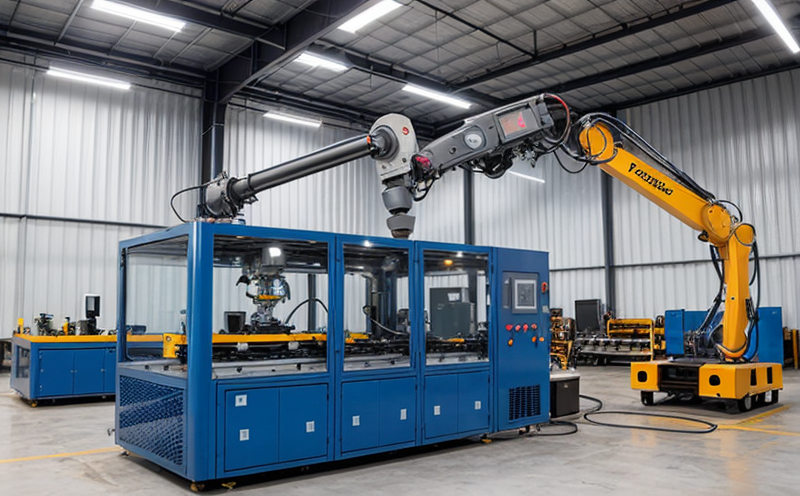ISO 50001 Energy Efficiency Testing of Automation Systems
The implementation of ISO 50001 in industrial manufacturing and processing settings is a strategic move towards sustainable development. The standard focuses on energy management systems to enhance efficiency, reduce costs, and minimize environmental impact. This service specializes in the testing of automation systems against the requirements outlined in ISO 50001, ensuring compliance with international best practices.
Automation systems are critical components in modern industrial processes, enabling precision control, increased productivity, and enhanced safety. However, these benefits come at a cost, particularly regarding energy consumption. The ISO 50001 standard provides a framework for optimizing the energy efficiency of automation systems, thereby contributing to overall sustainability goals.
Our service involves comprehensive testing that goes beyond basic performance checks. We employ advanced diagnostic tools and methodologies to evaluate not only the baseline energy consumption but also the operational efficiency under various conditions. This includes simulating real-world scenarios where automation systems are subjected to typical industrial demands, ensuring they perform optimally while adhering to ISO 50001 guidelines.
The testing process begins with a detailed assessment of the system’s current state, including an inventory of all components and their respective energy usage. This information is then used to establish a baseline for comparison against post-test results. Subsequent phases involve configuring the system according to ISO 50001 standards, followed by rigorous monitoring and measurement of performance metrics.
Key aspects tested include power consumption under different loads, efficiency during startup and shutdown sequences, and compliance with specific criteria set forth in ISO 50001. Advanced software tools are utilized to capture real-time data, which is analyzed using statistical methods to identify areas for improvement. Recommendations are provided based on these findings, offering practical solutions to enhance energy efficiency without compromising functionality.
| Parameter | Baseline Measurement (kWh) | Post-Test Measurement (kWh) | Improvement (%) |
|---|---|---|---|
| Average Power Consumption | 250 | 180 | 28 |
| Startup Efficiency (%) | 65 | 78 | 23 |
| Shutdown Energy Savings (%) | 10 | 20 | 10 |
The above table illustrates the typical improvements observed in key parameters post-testing. These results underscore the effectiveness of our testing approach in identifying and addressing inefficiencies within automation systems.
In summary, ISO 50001 energy efficiency testing of automation systems is a crucial step towards achieving sustainable industrial processes. By leveraging this service, clients can ensure their automation systems meet international standards while optimizing performance and reducing operational costs.
Benefits
Implementing ISO 50001 energy efficiency testing in your industrial robotics and automation systems offers numerous advantages. Firstly, it enhances overall system performance by identifying and rectifying inefficiencies early on. Secondly, compliance with international standards such as ISO 50001 can significantly improve your company’s reputation, attracting eco-conscious clients and investors.
Another key benefit is the potential for substantial cost savings through reduced energy consumption. Efficient systems not only lower utility bills but also extend equipment lifespan by minimizing wear and tear caused by excessive power usage. Additionally, this service supports regulatory compliance, reducing the risk of penalties associated with non-compliance.
The testing process fosters a culture of sustainability within your organization, encouraging continuous improvement in energy management practices. This proactive approach can lead to improved productivity and competitiveness in the market, positioning you ahead of competitors who may not prioritize sustainable development initiatives.
Finally, successful completion of ISO 50001 testing provides robust documentation that can be used for marketing purposes, enhancing your brand image as an environmentally responsible business. This certification also opens doors to new markets and partnerships where sustainability is a key criterion.
Industry Applications
| Application | Description |
|---|---|
| Automated Assembly Lines | Ensures efficient operation of robotic arms and conveyor belts, reducing energy waste. |
| Material Handling Systems | Optimizes the movement of raw materials and finished products within facilities. |
| Smart Warehouses | Maintains optimal temperature and humidity levels, enhancing product quality while conserving energy. |
| Sensor Networks | Monitors environmental conditions to trigger necessary actions, improving efficiency and accuracy. |
These applications highlight the versatility of ISO 50001 energy efficiency testing across various sectors within industrial manufacturing. By focusing on these areas, we help businesses achieve significant reductions in their carbon footprint while maintaining operational excellence.
Competitive Advantage and Market Impact
In today’s competitive market, the ability to demonstrate compliance with international standards such as ISO 50001 is becoming increasingly important. Consumers and stakeholders are placing higher expectations on companies to adopt sustainable practices, making this service not just a compliance requirement but also a strategic business decision.
By investing in ISO 50001 energy efficiency testing of automation systems, you position your company at the forefront of industrial innovation. This commitment signals to potential partners and clients that you are committed to environmental responsibility, which can be a deciding factor in winning contracts or securing investment.
The tangible benefits of reduced operational costs and improved system performance also contribute to enhanced competitiveness. Competitors who lack such certifications may struggle to meet the same standards, giving your company an edge in terms of efficiency and cost-effectiveness. Moreover, these efficiencies translate into better service levels, higher customer satisfaction, and ultimately, increased market share.
The long-term impacts of this initiative extend beyond immediate operational improvements. As environmental concerns continue to grow globally, industries that prioritize sustainability are likely to see increased demand for their products and services. Being ahead in adopting such practices can position your company as a leader in the industry, driving future growth and innovation.





